It's an impossibly haunted city, said the teenager walking on Dauphine toward Vaughan's Lounge, in the 9th Ward, where the Treme Brass Band was about to begin their 9 PM set last Friday night. We’d just finished dinner at Galatoire's, a family favorite French Creole restaurant on Bourbon Street. The teenager first ate there two days before the storm hit in August of 2005. That was a long time ago. The city changed; her grandfather passed, and she grew up. And the trips to NOLA continued, more when she was in high school, one part family pilgrimage, another a celebration of this odd, hot city. She’d flown in from Los Angeles, myself from New York for Jazzfest. On the way, I read Fabulous New Orleans, Lyle Saxon’s tales of the city, unpacking the layers of history here, stories of French, Spanish, and US rule, reflections on literary influences and friendships with Sherwood Anderson and William Faulkner. I still can’t get my head around the differences between Creole and Cajun people here. Neither can my cabdriver, a transplant from Honduras, who brought up his kids here. Sherwood Anderson wrote about the Creoles and their hot eccentricities. The Cajuns made their way here by way of Nova Scotia, French Canadians whom the British, in the 18th century, displaced from their French colony of Acadia. It's been a few years, but New Orleans is back, he says, final four, mardi gras, yet, its back. There’s people and their food, hot and spicy, with tomatoes and stew, as well as French inflections, with heavy sauces. The cabbie puts his kids on the phone to try to try to describe the relationship between Cajun and Creole food. The conversation gets us all the way to the old quarter.
Arriving at Galatoire's, I order a Vieux Carre, a drink, “invented in 1937 by Hotel Monteleone head bartender Walter Bergeron, who created the cocktail as a tribute to the ethnic groups that made up the French Quarter…”
The teenager has been there an hour after walking up from Cafe Flora.
She has a filet mignon.
Grandmom would love this, she says, looking back at it all.
Do you remember coming here with Grandad in 2005, I ask.
No.
I order a gumbo and then a pompano with crawfish, just like Dad did.
For a second there, it always feels like home, the green and white decor, unchanged, the heat, the trail out into the night, the street lamps, the stroll from the old quarter into the Faubourg Maringy, into the Bywater.
On those first trips, the teenager was immediately drawn to the gothic homes, haunted trees, that seemed to emanate Ann Rice stories of vampires, Lyle Saxon’s observations of voodoo rituals, Louis Armstrong’s horns:
“Every time I close my eyes blowing that trumpet of mine, I look right into the heart of good old New Orleans. It has given me something to live for,” says Armstrong.
“I came down here originally in 1972,” says John Goodman. “..had never seen anything like it — the climate, the smells. It’s the cradle of music; it just flipped me. Someone suggested that there’s an incomplete part of our chromosomes that gets repaired or found when we hit New Orleans. Some of us just belong here.”
I always feel that way.
I felt it from the very beginning, moved by the mystery when I was ten, walking the streets, listening to the tin drums, looking at the voodoo shops, exploring with Dad.
I still feel it here.
Walking, it's quiet, the smell of honeysuckle is in the air, silent, except for frogs and seccadas in the night. So quiet. Out of nowhere, the sound of music fills the air, people sitting about listening to what looks like a dixie band, crusty punks with their dogs, elders, everyone in shorts.
It's hot. We stayed to dance for a bit, chatting with a few of the punks.
And keep on walking.
A cat is sitting on the sidewalk.
We look at her, she at us.
She greets us.
Meow, she says, from the street, purring, rubbing her leg, coming up to us.
And get to Vaughan’s lounge on 4229 Dauphine St, a storied dive bar, music venue, famous for serving rice and beans, beer and marching bands; musicians sit about, inside and outside, talking, many from the neighborhood, others here for Jazzfest.
Our friend Remmy, who we met last year, comes to say hi to us.
He’s just moved.
We decided to get an apartment here, he smiles.
The topic turns to JazzFest.
We’re going to see Willie Nelson Sunday.
Canceled. A member of his band has covid, says Remmy.
It's ok Mavis Staples just signed on to play.
I love her says the teenager.
The city feels alive.
“We’ve been waiting patiently for our time to take off these temporary masks and put on our real masks again,” says Rickie Lee Jones, chatting about her upcoming show at JazzFest.
The brass band starts their set, heating it up.
I first came here to see Kermit play in 2004 during his legendary two decade run of Thursday nights here, rice and beans after the show to keep us all warm.
We dance as long as we can and make our way back.
Saturday morning, we greet the day; birds fly about on our roof patio in the hotel.
And we stroll down to Flora Cafe and Gallery for breakfast.
Full of art and neighborhood talismans, flyers for upcoming shows and art events, plants and a piano, it's our favorite spot here.
The teenager has made arrangements to meet friends at Parisite, a skater built public skate park on Pleasure Street.
After breakfast, we make our way.
Skaters and murals adorn the park, under a freeway, the whole space feels like poetry, skaters in motion.
Messages sprayed about:
Miss you spooky.
You don't need wings to fly.
Just skate.
It's ok not to be ok.
Toxic.
Parasite is for all of us.
Chatting with skaters around the world,
the teenager makes friends everywhere.
Next stop JazzFest, where Rickie Lee Jones is playing.
God is a woman, Kelly screamed, watching her play JazzFest years ago.
We love Rickie, her poetry, the jazz of it all, beat influences, Tom Waits, and poetry.
Introducing her band, she thanks Mike Dillan, our old friend from Ten Hands and BillyGoat from summer 1989 and 1990 in Dallas. I started crying. Didn't know he was still around, still showboating, still hogging the stage like Jaco Pastorius on the stage with Joni Mitchel. But he didn't have quite as lucky a fate.
“I’m a real improv artist,” says Jones, referring to Dillan, her musical soulmate. “Mike can go anywhere I want to go.” In recent years, Jones has made New Orleans her home, her spot. We’re jealous. Musical histories are blurring - Eddie Brickell to Rickie Lee Jones, Joni Mitchell to Jaco, to Mingus. I guess that's what JazzFest is all about. Its crazy sunstroke hot, 200 degrees. Stage after stage, soooo much music, each blurring into the next. Rebirth Brass Band, PussN Boots, Tokyo 2020, Big Chief, Stevie Nicks, that's right, singing songs from Rumors. We all cried while she sang landslide, and Mavis Staples singing talking heads slippery people covers, still here, singing freedom songs, still taking us there, all of us singing along.. Wanna feel ok, go to jazz fest and watch out culture merge freedom songs with rock n roll and blues and protest songs, being stressed out and working through it all, song after song all day long, from our favorite albums, more songs we’ve never heard. New stories everywhere. Rickie walked off the stage hand in hand with Mike D…
“Sunshine Only Happens when It's Raining,” sings Stevie Nicks, the lead track from Rumors, music crashing through my mind.
“Now there you go again, you say you want your freedom
Well, who am I to keep you down?
It's only right that you should play the way you feel it
But listen carefully to the sound of your loneliness
Like a heartbeat, drives you mad
In the stillness of remembering what you had
And what you lost
Of what you had
And what you lost
Thunder only happens when it's raining
Players only love you when they're playing
They say women, they will come and they will go
When the rain washes you clean, you'll know
You'll know…”
Mavis Staples, a gospel singer, who championed freedom songs during the civil rights years, is playing at a tent nearby.
Tonight I feel like dancing is her favorite song.
Staples leads with, slippery people, reminding us, she is not going anywhere.
I’ll take you there.
From her days singing freedom songs with King to the disco days of the 1970’s, she’s been taking us here, reminding us of something better, something we can be.
I’m not going anywhere, she tells us.
I want you to take us there.
She has the crowd. It's a love fest.
Standing ovation.
She lifts the roof off the place.
Musics everywhere, jazz and funk musicians jamming on organ and trumpet as we left, improvising, drum and bass thumping, on our way out.
“Baby you can drive my car!” the trumpet seemed to scream.
Beers, poppers, jello shots, water, gumbo, it's everywhere on our way up the Esplanade after the show.
After couple of miles we stop, sitting by a tree.
Crashing, on up to Buffas we walk till we are exhausted, grabbing a bite, in this most “quintessential New Orleans neighborhood bar[s].”
And make our way to St Claude, meeting up with the skating buddies we met earlier in the day, chatting long into the evening. Our new friend's dad works as a chef at one of the big restaurants; she’s just back from Berlin. Trains are zipping up and down the tracks when we leave. Should we jump on, the road to the unknown, into the night.
A fight is breaking outside of Big Daddies when I poke my head out of our room Sunday morning to sit on the patio.
Still the smell of the honeysuckle fills the air.
And we stroll to Flora Cafe.
A man is playing a closer walk with thee on the piano.
Down Dauphine, we explore, looking for our gatto from Friday night.
The little ones a little sad to be leaving.
There is something kind and welcoming here, something she deeply appreciates, a little hospitality.
Walking down Daphine, we stop at Frady’s, our favorite breakfast spot.
It's closed, but Frady is there.
We talk about the old shop, he opened after returning from the Korean War, his amicable son still running the place, six days a week, sleeping in on Sunday.
He lived in New York for a bit, but this felt like home.
He knew the neighborhood needed a place with affordable food.
He didn’t want to rob anyone.
Everywhere, they need a good bodega.
‘Y’all come back now,” he tells us, on his way to Brunch.
We are keeping our eye out for our gatto, who we met Friday night.
No sightings.
The owner of Vaughn’s is setting up.
Bartenders arrive at 1230 he says.
We keep on walking to the end of the world, a decommissioned, long abandoned Navy yard, turned public park, chatting about New York and Los Angeles, and music and people, Chicago Surrealists and Olympia, art history and gender studies.
Waters are rising, there isn’t as much development here.
Everyone knows what's coming.
THe teenager first visited here before Katrina.
Ida was a reminder.
The waterfront defines the city, as it rises, so goes the city.
It was built to defend the river.
The river opens up, connecting the city with Canada and the Caribbean, where New Orleans is considered the Northernmost tip on trade routes.
Hi Dad, I say, looking at the bywater where we spread Dad’s ashes years ago.
I'll be there one day too.
On we walk through the park, along the labyrinthine, past squats and a sharing corner.
Something like an art work of found objects, a tampon, a whippet, and a forgiveness lay there on the ground.
People are cleaning up.
There have been fires the night before.
Some kids are at the makeshift skate park.
Up to St Claude we walk, looking at bookstores, chatting away, getting tips for crawfish.
Finding our way to the Cajun Seafood Market on Claiborne across from Kermit’s Mother N Laws Lounge, a funky bar & lounge. Outside, people are selling their wares, bbqing for Jazzfest.
No one is sure how much crawfish to order.
We end up with a lot, way more than we can manage.
Rip the head off, tale goes first, then a taste of the head.
Wow, that's good, spicy and wonderful.
My hands are spicy; soes my tongue, soes everywhere, my whole soul.
We are fortified.
The Esplanade leads to Jazzfest, which leads to more music, the gumbo of American music, ever mixing ingredients, Cool and the Gang to Dixieland, to Rickie Skaggs to Buddy Guy to Trombone Shorty on the festival stage.
Feels sooo good to be here, he says.
Everyone agrees.
I can’t even get to see Kermit.
I run back to see Buddy Guy, 85 years young, who is jamming:
“You damn right, I've got the blues
From my head down to my shoes
You damn right, I've got the blues
From my head down to my shoes
I can't win, 'cause I don't have a thing to lose
I stopped by my daughter's house
You know I just want to use the phone
You know my new grandbaby came to the door
And said, granddaddy, you know ain't no one at home.”
There is more music than I can imagine.
Of course I have the blues, he sings.
Any thinking person is going to have them.
The teenager has them, already missing New Orleans. We have not even left yet.
She already knows what Louis Armstrong was telling us.
A funny crew of us cab up the the quarter.
I have to visit Faulkner’s old house on Pirates Alley, where Sherwood Anderson and Fauker cavorted up top.
The Cabildo is down the street.
I stop to look at the sky above Jackson Square.
Its history seems from the square, the streets, the walk down to the water front and back.
I’m still fascinated with it, the stories of French, Spanish, and American empires vying for control, pushing back indigenous populations, the wars, ideas and people who made their way through, continuing with revolutions, plagues, fires and floods.
I still can’t tell the difference between cajun and creole people, one seems more French, the other a little spicier, more latin, depending on who you talk to.
“This is a Creole French restaurant,” says the waiter at Galatoire's.
It feels beyond the USA, this little place, one of the three great US cities, as Tennessee Williams puts it. “The thing Americans seemed to resent most was a certain pagan spirit in the Creoles,” writes Lyle Saxon, another of Anderson’s NOLA buddies, writing about the city. I imagine all three of them throwing beer cans at people below Faulkner’s second floor apartment there.
Eat, drink and be merry for tomorrow we die starts to feel like a motto for this semi tropical climate which seems to “destroy puritanism,” says Saxon.
The teenager has to move.
We find our way down Decatur, past the Abbey, across the Esplanade, where the crusty punks and their dogs hang, down Frenchman and St Claude, before one last stroll to Vaughans, chatting about the fun, the friends we met, sad we missed Willie, wondering if we’ll get another chance, lamenting the end of the trip, and days to be.
Of course we have the blues,
It's hard leaving New Orleans.
It's hard leaving.
Hopefully it's not too long before we return.
































































































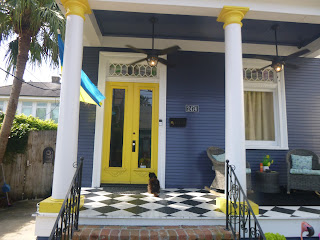







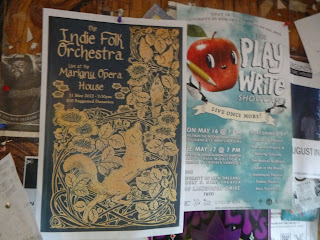




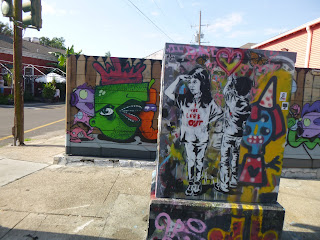





























































































































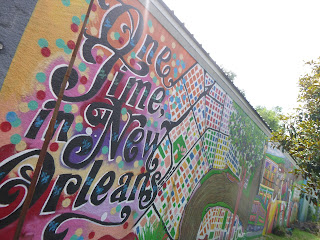

























































































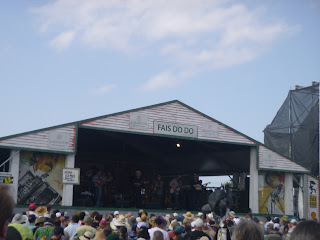


No comments:
Post a Comment